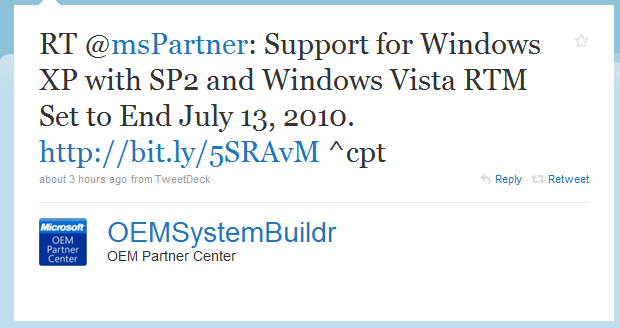Windows 7 compatibility problems? Microsoft might have an app (or service) for that

Microsoft is continuing to emphasize its "businesses should upgrade sooner rather than later" message with Windows 7 -- and is using both carrots and sticks to push them to do so.
The latest attempt to convince customers comes in the form of take-aways Microsoft officials have uncovered and are sharing publicly from some of the early Windows 7 enterprise deployments. Norm Judah, the Chief Technology Officer of Microsoft Services (the group that encompasses Microsoft Consulting Services, consumer support and commercial support) discussed some of these learnings and offered advice during an interview I had with him on December 7.
While it's pushing businesses to kick off deployment now, Microsoft isn't suggesting enterprise users rush into things; in fact, Microsoft has been an advocate of measured, 12-month-plus evaluation, assessment, compatibility testing, deployment and training period.
"The assessment of compatibility is turning out to be the most interesting part" of the Windows 7 deployment process, said Judah, whose team is helping shepherd a number of companies through the process. "In some cases, the remedies (for compatibility problems) are fairly simple," he said. (Microsoft provided, via a press release, an example of an unnamed European petrochemical company which was able to fix Windows 7 compatibility problems with more than 1,000 custom apps written in Visual Basic by changing a library module that was common to all of those apps.)
"There's also the question as to whether customers really need an (incompatible) application," Judah said. When performing an evaluation, customers have a chance to figure out which apps are worth taking the trouble to try to fix vs. which can be "discarded," he said. Judah cited as an example of an app that might be discardable as Lotus Notes... And no, I'm not kidding.
(Maybe if Microsoft is throwing in a free copy of Exchange plus offering to do all the migration work from Notes to Exchange. Otherwise, I'd tend to think Notes might fall more into the "mission critical" than the "who cares" department.)
Microsoft is continuing to flood businesses with Windows 7 deployment tools. Some of these are paid and offered to volume licensees only (like the Microsoft Desktop Optimization Pack set of tools.) Others are free frameworks, reference architectures, white papers and other kinds of aids. There's a set of Desktop Deployment Planning services (another Software Asurance licensee-only offering) and Desktop Deployment Jumpstart. Judah's team will perform on-site handholding and consulting to companies who want more help. He said Microsoft Services has helped some early deployers develop and run scripts that help secure and harden Windows 7 desktops.
There's another part to what Judah's team does: He and his troops take the learnings from the field back to Microsoft product groups to help them figure out what's working and isn't as they continue to provide service and support -- as well as begin to work on service packs and the next versions of new products. At the same time, via a new program launched this year, Microsoft Services is packaging up the intellectual property it is acquiring while working on these kinds of deployments and providing it to Microsoft's reseller partners via the "Services Ready" program.
If all those carrots aren't enough to convince companies to move to Windows 7, Microsoft also is continuing to wield the stick. On Twitter, I've seen the OEM System Builder team tweet more than once over the past couple of days about the pending expiration of support for Windows XP SP2 and the Vista RTM (release-to-manufacturing version, not Vista SP1 or SP2). End of paid, extended support for XP SP2 is slated for July 13, 2010. End of free, mainstream support for Vista ends the same day. Consider yourself warned.
